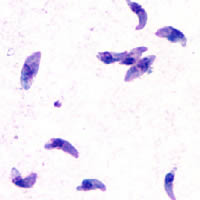Toxoplasma gondii
Toxoplasma gondii is an obligate intracellular, parasitic protozoan belonging to the family Sarcocystidae. It is known to cause the infectious disease Toxoplasmosis, a condition that may pose serious health risks, particularly to pregnant women and immunocompromised individuals.


Life Cycle and Hosts[edit]
The definitive hosts are cats, both wild and domestic. Within their intestines, T. gondii undergoes sexual reproduction, resulting in the shedding of oocysts into the environment. Birds and rodents often serve as intermediate hosts, harboring the asexual stages of the parasite. These hosts play a crucial role in the transmission cycle by inadvertently spreading the parasite through their tissues.
However, T. gondii is capable of infecting nearly all warm-blooded animals, including humans. The parasite’s adaptability to various hosts contributes to its widespread distribution and prevalence.
Modes of Transmission[edit]
Human infection with T. gondii occurs primarily through:
- Ingestion of tissue cysts from undercooked or raw meat.
- Consuming food or water contaminated with oocysts shed in cat feces.
- Congenital transmission from an infected mother to her fetus.
- Less commonly, through organ transplantation or blood transfusion.
Clinical Manifestations[edit]
In most cases, T. gondii infection is asymptomatic, meaning individuals show no noticeable signs. When symptoms occur, they often resemble a mild flu-like illness, with swollen lymph nodes, muscle aches, and fatigue.
Severe toxoplasmosis can lead to significant complications, particularly in:
- Immunocompromised individuals (e.g., those with HIV/AIDS)
- Infants born to mothers who contract T. gondii during pregnancy.
Potential complications include damage to the brain, eyes, and other organs.
Diagnosis[edit]
Diagnosis of T. gondii infection typically involves serological testing, which detects antibodies against the parasite. In some cases, other diagnostic methods may be employed, such as:
- Polymerase chain reaction (PCR) for detecting T. gondii DNA.
- Histological examination of tissues to identify parasite stages.
Treatment and Prevention[edit]
In healthy individuals, the immune system often controls the infection without the need for treatment. However, antiparasitic medications are generally prescribed for individuals with severe symptoms or compromised immunity.
Preventive measures include:
- Cooking meat thoroughly to kill tissue cysts.
- Washing fruits and vegetables before consumption.
- Avoiding contact with cat feces, such as when handling cat litter.
Public Health Implications[edit]
T. gondii infections are common in livestock, including pigs, cattle, and poultry. These animals can acquire infection from contaminated environments, leading to tissue cyst formation. Consuming undercooked meat from these animals is a significant route of transmission to humans.
In addition, the prevalence of T. gondii in cats presents ongoing environmental challenges. Individuals handling contaminated soil or cat litter risk exposure to infectious oocysts. Efforts to mitigate this public health issue focus on improving food safety standards and educating the public about preventive strategies.
Advances in Research[edit]
Current research aims to:
- Uncover the unique biological traits of T. gondii.
- Develop effective vaccines and new antiparasitic drugs.
- Understand host-pathogen interactions to improve treatment outcomes.
- Study the genetic diversity of T. gondii populations to better predict patterns of transmission and disease severity.
Continued advancements in these areas promise to improve prevention, diagnosis, and management of toxoplasmosis worldwide.
Summary[edit]
Understanding the biology, epidemiology, and pathogenesis of T. gondii is fundamental to devising effective strategies for the diagnosis, prevention, and treatment of toxoplasmosis. Moreover, raising public awareness about the routes of transmission of this parasite is crucial in reducing the incidence of infection.
See Also[edit]
| Protozoan infection: SAR and Archaeplastida | ||||
|---|---|---|---|---|
|
Ad. Transform your life with W8MD's Budget GLP-1 injections from $75


W8MD offers a medical weight loss program to lose weight in Philadelphia. Our physician-supervised medical weight loss provides:
- Weight loss injections in NYC (generic and brand names):
- Zepbound / Mounjaro, Wegovy / Ozempic, Saxenda
- Most insurances accepted or discounted self-pay rates. We will obtain insurance prior authorizations if needed.
- Generic GLP1 weight loss injections from $75 for the starting dose.
- Also offer prescription weight loss medications including Phentermine, Qsymia, Diethylpropion, Contrave etc.
NYC weight loss doctor appointmentsNYC weight loss doctor appointments
Start your NYC weight loss journey today at our NYC medical weight loss and Philadelphia medical weight loss clinics.
- Call 718-946-5500 to lose weight in NYC or for medical weight loss in Philadelphia 215-676-2334.
- Tags:NYC medical weight loss, Philadelphia lose weight Zepbound NYC, Budget GLP1 weight loss injections, Wegovy Philadelphia, Wegovy NYC, Philadelphia medical weight loss, Brookly weight loss and Wegovy NYC
|
WikiMD's Wellness Encyclopedia |
| Let Food Be Thy Medicine Medicine Thy Food - Hippocrates |
Medical Disclaimer: WikiMD is not a substitute for professional medical advice. The information on WikiMD is provided as an information resource only, may be incorrect, outdated or misleading, and is not to be used or relied on for any diagnostic or treatment purposes. Please consult your health care provider before making any healthcare decisions or for guidance about a specific medical condition. WikiMD expressly disclaims responsibility, and shall have no liability, for any damages, loss, injury, or liability whatsoever suffered as a result of your reliance on the information contained in this site. By visiting this site you agree to the foregoing terms and conditions, which may from time to time be changed or supplemented by WikiMD. If you do not agree to the foregoing terms and conditions, you should not enter or use this site. See full disclaimer.
Credits:Most images are courtesy of Wikimedia commons, and templates, categories Wikipedia, licensed under CC BY SA or similar.
Translate this page: - East Asian
中文,
日本,
한국어,
South Asian
हिन्दी,
தமிழ்,
తెలుగు,
Urdu,
ಕನ್ನಡ,
Southeast Asian
Indonesian,
Vietnamese,
Thai,
မြန်မာဘာသာ,
বাংলা
European
español,
Deutsch,
français,
Greek,
português do Brasil,
polski,
română,
русский,
Nederlands,
norsk,
svenska,
suomi,
Italian
Middle Eastern & African
عربى,
Turkish,
Persian,
Hebrew,
Afrikaans,
isiZulu,
Kiswahili,
Other
Bulgarian,
Hungarian,
Czech,
Swedish,
മലയാളം,
मराठी,
ਪੰਜਾਬੀ,
ગુજરાતી,
Portuguese,
Ukrainian


